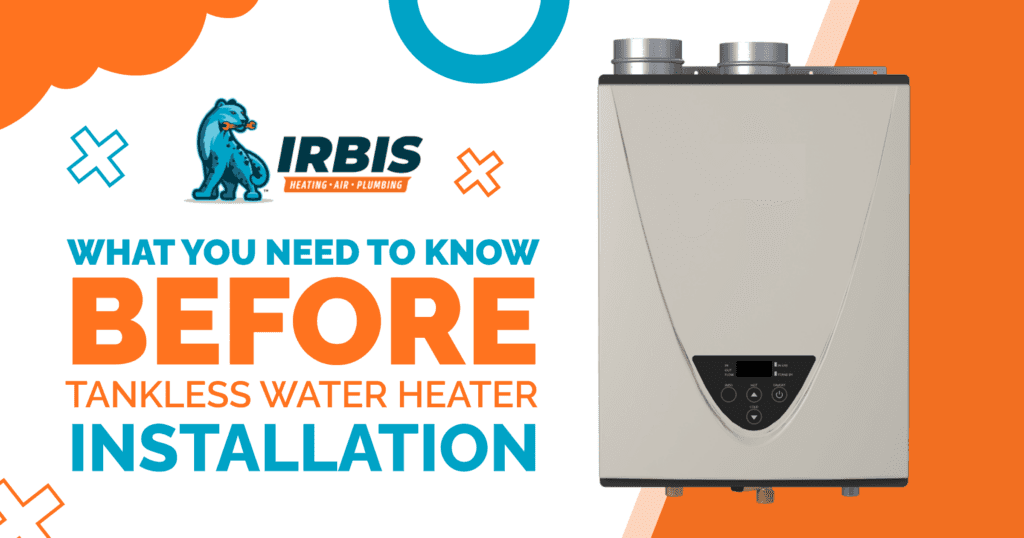
A tankless water heater heats water only when needed, saving energy. You won’t spend money to continuously heat a 40- or 50-gallon tank of water. Tankless units have been available in the U.S. since the 1990s and can cut home fuel costs in half. While it’ll reduce energy costs and save space, tankless water heater installation is a big decision that requires some consideration. Here’s what you need to know before hiring a plumber for the job.
Size and Capacity
Tankless water heaters are small compared to their tank-based counterparts. They can fit in a utility closet or laundry room. But when we talk about size, we’re looking at the unit’s capacity, which is determined by its flow rate in gallons per minute (GPM). Depending on the model, tankless water heaters range from 1.2 to 6 GPM. You can calculate how many fixtures it can supply at once by knowing the flow rate of each.
The flow rate of common plumbing fixtures/appliances is as follows:
- Bathroom/Kitchen Faucet: 2.5 GPM
- Dishwasher: 0.5 to 1.5 GPM
- Toilet: 2.2 to 3.0 GPM
- Shower: 2.5 GPM
- Washing Machine: 1.0 to 2.5 GPM
- Tub: 4.0 GPM
A technician will also determine the British Thermal Units (BTUs) per gallon the heater needs. They’ll estimate peak demand and total BTU output as well. To compare the efficiency ratings of different units, check the specifications of each for its Uniform Energy Factor.
Water Temperature
The temperature of hot water at home is typically 110℉ to 120℉. A water heater’s temperature rise is important here because incoming water is much cooler. If it’s 57℉ and you want your shower water to be 110℉, your tankless water heater must provide a temperature rise of 53℉. The required temperature rise varies with groundwater temperature, which varies from 37℉ to 51℉ in northern parts of the U.S. to 62℉ to 77℉ in southern regions.
The Type of Heater You Need
An important consideration for tankless water heater installation is the type of unit you want. Depending on your needs and preferences, you can choose from:
- Gas Units: Providing fast response times and superior heat output, a gas tankless water heater may use a pilot light, direct ignition (which uses electricity or batteries), or power ignition (which starts as water flows through a turbine). The downside is these may use more gas than a traditional water heater.
- Electric Units: These are generally more affordable and efficient than gas heaters. People often prefer them for their lower environmental impact. An electric tankless water heater may use more energy. However, it does not release exhaust gases and doesn’t need a vent.
- Point-of-Use (POU) Units: If you need extra hot water for a utility sink, hot tub, or other fixture or appliance, a POU water heater can be installed in a small space. Depending on the location, this can be under a sink or inside a small cabinet.
- Hybrid Units: A hybrid electric heat pump water heater combines the best assets of a tankless and tank-style water heater. It is a highly energy-efficient option. The heat pump pulls heat from the surrounding air to heat the water and can release cool air into the nearby space.
Energy Efficiency
A high-efficiency, whole-home tankless water heater can yield up to 40% energy savings. It turns on only when a hot water tap is running, so it consumes much less energy than a traditional unit. The exact amount of energy you can save depends on the size of your household, how much hot water you use daily, and local rates for the fuel source used.
Venting Requirements
You’ll need a venting system if your tankless water heater is gas-fueled and installed indoors. A trained professional must help with setting up a vent. Outdoor units don’t have to be vented. Electric units don’t emit exhaust fumes, so venting is not necessary.
Warranty
The warranty is an important consideration when planning tankless water heater installation. Most brands have a 10-year warranty on the heat exchanger and a three- to five-year warranty on most other parts.
Common Questions
What Does Tankless Water Heater Installation Cost?
The average cost of installation ranges from $1,200 to $3,500 but can exceed $6,000 (as of 2023).1 Costs vary depending on the model and include what you may pay for installation and potential electrical or gas line upgrades.
Do I Need a Plumber to Install a Tankless Water Heater?
You’ll need a plumber to set up water, gas, or electrical connections. A technician ensures the job is done safely and is up to code. Simple installations take less time, but a complex installation can take up to 10 hours.
What Does the Installation Process Entail?
The first steps include turning off the water supply and removing the old water heater. The tankless water heater is then mounted. Depending on the type, vent piping is set up, and the unit is connected to a gas line. The water lines are connected next and the plumber will install a pressure relief valve. A faucet is turned on to purge air from water pipes and the heater. The technician will then start up and test the system.
Contact IRBIS for Tankless Water Heater Installation
At IRBIS, our technicians are extensively trained in installing tankless water heaters. We provide high-quality, efficient products and help select the type, brand, and model suited for your home. Whether you choose a gas or electric unit when it’s time for a water heater replacement, we’ll make sure it’s functional, efficient, and safe to use. Call (669) 322-8182 for more information or to book an appointment.

